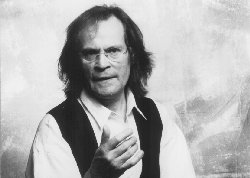Joachim Carlos Martini
Joachim Carlos Martini (born May 4, 1931 in Valdivia , Chile ; † November 29, 2015 in Frankfurt am Main , Germany ) was a German music researcher and conductor .
In the 1960s he founded the “Junge Kantorei” choir, which he directed until 2013, and the Barockorchester Frankfurt together with his wife, the violinist Judith Freise, and musician friends . Under his direction, 20 recordings were made on vinyl and CD .
life and work
Joachim Martini was born in Chile to German parents. After the family returned in 1938, he went to school in Berlin, West Prussia and Schleswig-Holstein. Inspired by his parents' house, he discovered his passion for music at an early age.
He studied German and history in Göttingen and Frankfurt am Main and was also interested in philosophy, art history and musicology. When Max Horkheimer and Theodor W. Adorno Martini lectures listened to the music aesthetics and sociology of music, with Kurt Thomas , he studied choral conducting and oratorios practice where Hellmuth Franz orchestral conducting and opera practice. After passing the first and second state exams, he entered the teaching post at secondary schools.
The love of music and the influence of Adorno, with whom he was on friendly terms during his studies and beyond, allowed Martini to continue working on his musical training alongside his teaching profession. He passed the cantor examination at the Frankfurt church music school and supplemented his musical training with conducting courses at the Salzburg Mozarteum with Dean Dixon and Hermann Scherchen .
From 1958 on, he directed the student choir of the Johann Wolfgang Goethe University in Frankfurt am Main and established its reputation by performing sacred works, primarily from the Romantic period. In 1961 he founded the "Hessian School Choir" together with Fritz Eitel, who was then the state youth pastor of the Evangelical Church in Hesse and Nassau. Like the student choir, it was absorbed into the Junge Kantorei in 1968, the direction of which Martini was full-time until 2013. In 1986 Martini founded the Frankfurt Baroque Orchestra together with musician friends and thus provided the Junge Kantorei with an ensemble that was appropriate to its program.
Together with Judith Freise, concertmaster of the Frankfurt Baroque Orchestra, Joachim Carlos Martini set up the Frankfurt archive “Persecuted Musical Life in the Nazi Era”. In this context he researched the biographies and works of Jewish musicians during the time of the National Socialist terror. This work was reflected in a number of publications and three exhibitions, including »Music as a Form of Spiritual Resistance. Jewish musicians, 1933 to 1945 - the example of Frankfurt «. The exhibitions were shown in the Paulskirche in Frankfurt, in the Wiesbaden state parliament, in the universities of Frankfurt, Leipzig and Erfurt, in Strasbourg and Chicago. In this context, Martini prepared lost compositions by Jewish composers, which he performed with the Junge Kantorei.
One focus of Martini's musical work was on the work of Georg Friedrich Handel . He reconstructed the scores of a number of oratorios, which were performed at the traditional Whitsun concerts in Eberbach Monastery , Bonn and Heidelberg , based on the original manuscripts, some of which were unpublished . In the years 2000 to 2003 the pasticcio oratorios "Nabal", "Gideon" and "Tobit", which the Handel student and assistant John Christopher Smith Jr. put together from the master's music, had their first performance in around 240 years ( see the English-language website for this composer ).
Martini also broke new ground with the series “In Search of the Lost Sound”: The program featured largely unknown works by composers from the late Renaissance and early Baroque periods , each with a focus on Italy, France, England, Spain and Portugal.
Awards
- December 2002: Cross of Merit on ribbon of the Order of Merit of the Federal Republic of Germany .
- September 2015: Plaque of honor of the city of Frankfurt am Main
Publications
- Fonts
- Music as a form of spiritual resistance. Brandes + Apsel, Frankfurt 2010, ISBN 978-3-86099-622-5 .
Individual evidence
Web links
- Works by and about Joachim Carlos Martini in the catalog of the German National Library
- Collection Joachim Carlos Martini in the German Exile Archive of the German National Library
| personal data | |
|---|---|
| SURNAME | Martini, Joachim Carlos |
| BRIEF DESCRIPTION | German music researcher and conductor |
| DATE OF BIRTH | May 4, 1931 |
| PLACE OF BIRTH | Valdivia , Chile |
| DATE OF DEATH | November 29, 2015 |
| Place of death | Frankfurt am Main , Germany |
